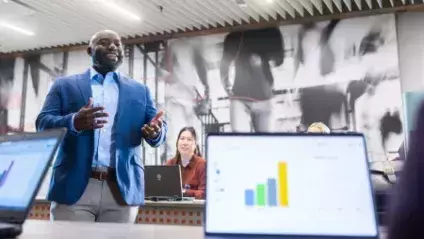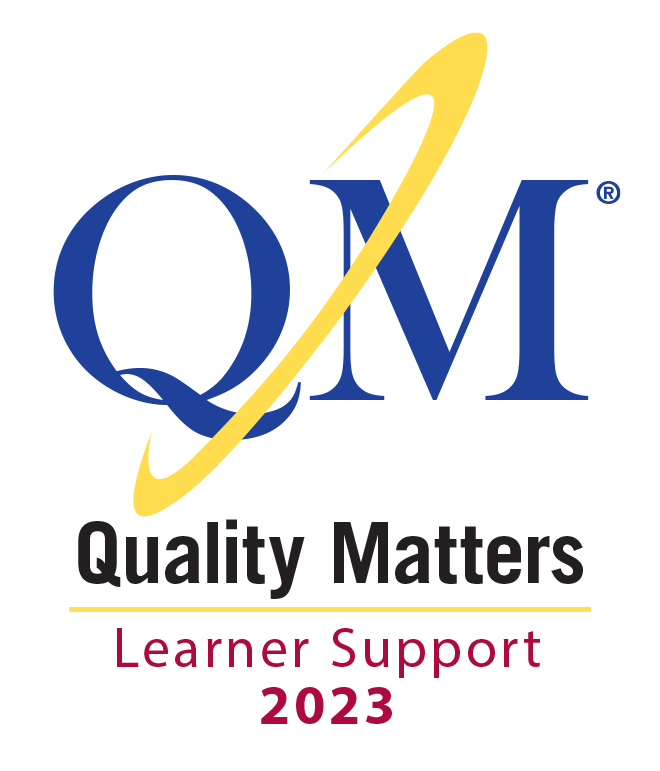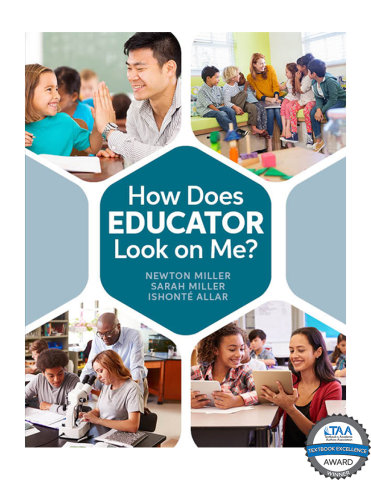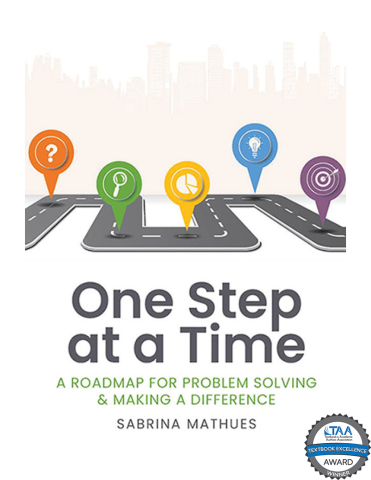Questions? Request Information
Prepare to Work with Diverse Learners
You can play a vital role in a student’s life by improving their educational experience when you earn your Bachelor of Arts in Education Studies from UAGC. With your online education studies degree, you’ll help shape the education of children, adolescents, and adults in a wide range of environments.
In this program, you’ll build a strong foundation and develop your instructional skills, including communication, group behavior, and human development. Your bachelor’s degree in education studies courses cover topics from phonics and English language learning to educational curriculum creation and child development. You will learn to adapt instructions to meet the unique needs of diverse learners.
Upon completion of your education studies degree online, you will be able to:
- Design effective curriculum, instruction, and assessment to meet the needs of diverse learners
- Demonstrate knowledge of child and adolescent development in the cognitive, social, physical, and emotional domains
- Identify the unique needs of special learners and adapt curriculum and instruction to meet these needs
- Apply alignment practices of standards, instruction, and assessment to identified academic, district and state standards, goals, and priorities as part of the planning and material selection process
- Apply foundational research skills to a topic of interest in an area of education
UAGC Award-Winning Curriculum
Military Students $250.00/credit
Undergraduate Courses $460.00/credit
Technology Fee** $115.00/course
Books and Other Class Materials** $125.00/average per course
Graduation Fee $150.00
Total Program Cost See UAGC Catalog¹
¹Keep in mind that this figure doesn’t factor in any potential discounts, partner benefits, or impact of accepted transfer credits, if eligible.

UAGC offers enrolled students access to ScholarshipUniverse, a platform that tailors external scholarship opportunities to your unique situation, making it easier to find and apply for scholarships.
UAGC is proud to provide reduced tuition rates for our academic and corporate partners, helping community college transfer students and corporate employees earn their degrees at a lower cost.


Course Overview
To earn your Bachelor of Arts in Education Studies at the University of Arizona Global Campus, you must complete 120 credits. You will need to complete 30 upper-division credits, of which 18 credits must be from the major program. A total of 30 credits must be completed at the University of Arizona Global Campus to meet the residency requirement. You may be able to transfer approved credits from community colleges, other previous college coursework, or other life experiences such as military service or job training toward your degree.
This program is not designed to meet the state educational requirements for teacher licensure or certification in any state. Students seeking teacher licensure shall carefully research their state's requirements prior to enrollment and regularly review the requirements as they are subject to change. Requirements vary by state. Graduates will be subject to additional requirements on a state-by-state basis that will include one or more of the following: student teaching or practicum experience, additional coursework, additional testing, or, if the state requires a specific type of degree, earning an additional degree. None of the University of Arizona Global Campus online education programs are accredited by the Council for the Accreditation of Educator Preparation (CAEP), which is a requirement for certification in some states. Other factors, such as a student’s criminal history, may prevent an applicant from obtaining licensure, certification, or employment in their field of study.
Alabama Students: Authorization to provide an education program does not indicate eligibility for an Alabama professional educator or professional leadership certificate. Applicants who complete an education or educator preparation program at a non-Alabama institution must apply for an Alabama professional educator or professional leadership certificate through the Alabama Certificate Reciprocity Approach. Current requirements may be found at https://www.alabamaachieves.org/teacher-center/.
California Students: An education degree offered through the University of Arizona Global Campus online modality does not lead to teacher licensure in the state of California. In order to obtain teacher licensure, a baccalaureate or higher degree, except in professional education, from an approved accredited college or university is required. Thus, the Bachelor of Arts in Education Studies degree offered at the University of Arizona Global Campus will not satisfy the baccalaureate degree requirement in the list of qualifications needed to obtain a single subject teaching credential in the state of California.
Current requirements for the single subject teaching credential for teachers prepared in California may be found at https://www.ctc.ca.gov/credentials/leaflets/single-multiple-subject-credentials-(cl-560c).
Current requirements for the single subject teaching credential for teachers prepared outside of California may be found at https://www.ctc.ca.gov/credentials/leaflets/Single-Subject-Credentials-Outside-CA-(CL-560).
Current requirements for the multiple subject teaching credential for teachers prepared in California may be found at https://www.ctc.ca.gov/credentials/leaflets/multiple-subject-teaching-credential-(cl-561c).
Current requirements for the multiple subject teaching credential for teachers prepared outside of California can be found at https://www.ctc.ca.gov/credentials/leaflets/multiple-subject-teaching-cred-(cl-561).
Kentucky Students: Please be advised that although the University of Arizona Global Campus offers a variety of programs aimed at preparing potential educators in diverse settings, our programs are NOT accredited in Kentucky by the Education Professional Standards Board and are NOT recognized for initial, additional, or renewal of certification or salary enhancement (rank change) for K-12 educators in Kentucky. For more information, please visit the Education Professional Standards Board’s website at http://www.epsb.ky.gov/mod/page/view.php?id=220
Missouri Students: Contact the Missouri Department of Elementary and Secondary Education, Routes to Certification at 573-751-0051 or at https://dese.mo.gov/educator-quality/certification/routes-certification to verify additional coursework and/or other requirements and how those requirements can be met in Missouri.
Certain degree programs may not be available in all states.
The Online Teaching Support Certification recognizes programs that require all online faculty to undergo training in best practices for online course delivery, provide faculty with ongoing pedagogical support, encourage faculty professional development to increase their knowledge and skill in online teaching, emphasize instructor availability and feedback to learners, and collect and use feedback from learners to improve online teaching. Learn More

The Online Learner Support Certification recognizes programs that provide all the critical student and academic services needed for learner success and use learner feedback to continuously improve those services.

What Can I Do With a Degree in Education Studies?
If you earn a BA in Education Studies, some of careers you may choose to pursue include:
- Teacher Aide
- Educational Assistant
- Childcare Worker
- Tutor
Gain insights into the education studies job market by reviewing the Bureau of Labor Statistics market outlook report.
I chose UAGC because of the flexibility with the schedule and the accessibility to staff whenever I needed guidance.
BA in Education Studies FAQs
-
Explore a wide variety of job possibilities while pursuing your passion for educating others. An online BA in Education Studies can teach you the necessary skills to educate others in a multitude of career fields. If you aren’t quite sure what sector you are interested in working in just yet, that’s OK, because a bachelor’s degree in education studies can offer you the educational skills that can be relevant in a wide variety of fields. Education studies students are presented with many options, as there are different specialties that can fit your specific interests.
-
Explore child and adolescent development through the lens of learning and education. Your bachelor’s in education studies courses cover topics such as phonics and English language learners, curriculum, and educational psychology.
-
The online education studies program at UAGC incorporates elements of educational theory and practice, such as reflective assignments, online discussions, and virtual simulations. Students can also apply these principles in their future educational roles, whether in person or online.
-
The online BA in Education Studies program at UAGC is designed to fit your busy schedule. Each class is five weeks long, and you only take one class at a time, so you can focus on one subject and get an in-depth understanding of each topic you’re learning. The classes are fast paced, but you will have 24/7 support and resources available to you.
-
Yes, a BA in Education Studies is an excellent choice for those who are passionate about education and working with people of all ages.
See What Else UAGC Has to Offer
Questions? Request More Information
To access this rate using the Liberty Grant, only eligible undergraduate active duty service members, members of the National Guard, Reservists, spouses of active duty, members of the National Guard and Reservists, Department of Defense employees using Tuition Assistance (TA), and civilian employees of the United States Coast Guard (only if utilizing Military Tuition Assistance) will qualify.
**
The Technology Fee covers access to University systems such as the online classroom, the Student Portal, and other academic resources. The Technology Fee and the Course Digital Materials (CDM) Fee are fully refundable if a student does not attend beyond Day 3 of a course (Week 3 if covered under the University of Arizona Global Campus Promise Refund Schedule). After this time, the fee becomes non-refundable. Students are charged the Technology Fee for repeated coursework. Students are not charged the CDM fee for repeated coursework if previously charged.
†
The transferability of credits is subject to the University of Arizona Global Campus transfer credit policies and requires the submission of official transcripts. The official transcripts will be evaluated by the Registrar’s Office to determine the credits that will officially apply toward a UAGC degree program. Credits must be earned at the same degree level in order to be applied. Additional restrictions may apply. See the UAGC Academic Catalog for full undergraduate and graduate transfer policies.





